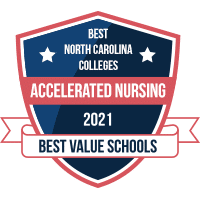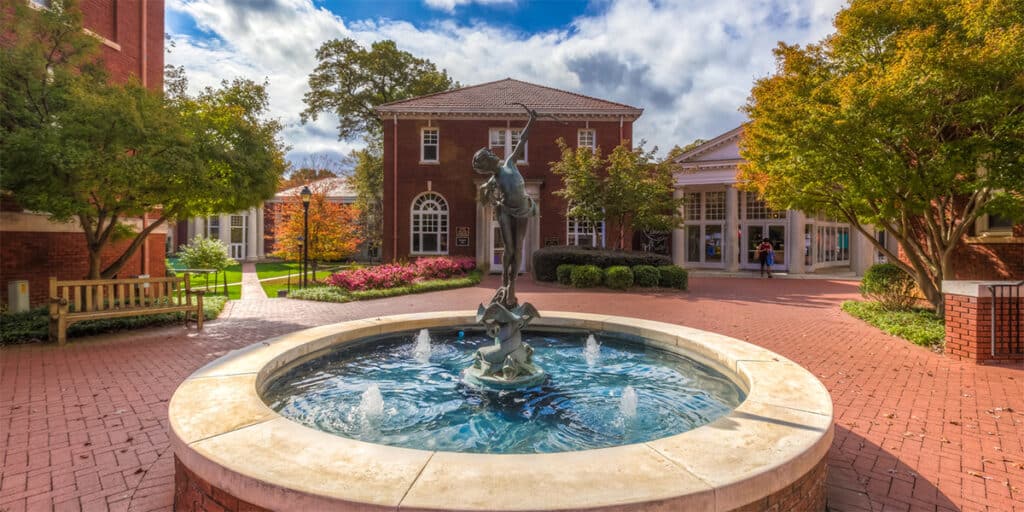
Nursing is a profession that is in constant demand. The Bureau of Labor Statistics or BLS is expecting career opportunities within the field of nursing to grow seven percent through the year 2029. This is faster than most professions. One of the reasons why the field of nursing is in such high demand is because of shortages caused by diminishing educators, high turnover, and unequal workforce distribution, to name a few. Students interested in pursuing an accelerated nursing program in the North Carolina area will find that there are many programs available with a wealth of different educational opportunities.
1. Duke University, Durham
Duke University is a private research university founded by the Methodist and Quakers in 1838. The Duke University Health System is one of the most prestigious in the nation. Students seeking an accelerated nursing degree can take advantage of a faculty of instructors who’ve earned their doctorate. The sixteen-month program exposes students to evidence-based nursing as well as patient care techniques that emphasize cultural relativity. Nursing students also have the opportunity to explore the clinical part of their education with access to the state of art Center for Nursing Discovery center which happens to be the best health care simulation facility in the state.
- Accreditation: The Southern Association of Colleges and Schools Commission on Colleges (SACSCOC)
- Tuition: $77,029
- Acceptance Rate: 8%
- Graduation Rate: 95%
- Average NCLEX pass rate: RN/97.2%
2. The University of North Carolina at Chapel Hill
The University of North Carolina at Chapel Hill is the flagship of the University of North Carolina system. Students have access to a Public Ivy, or a public institution commensurate to an Ivy League university. Students pursuing an ABSN at UNC will take a 15-month program that starts in May. Students also take part in clinical rotations at various health care facilities in the Orange County area.
- Accreditation: The Southern Association of Colleges and Schools Commission on Colleges
- Tuition: $24,228
- Acceptance: 23%
- Graduation: 91%
- Average NCLEX pass rate: RN/96.20%
3. Winston-Salem State University

Winston-Salem State University is a historically black university and is also part of the University of North Carolina. Students can take advantage of a nursing program that graduates most of the traditional nurses in the states. It should also be noted that ninety percent of its students pass the NCLEX-RN the first time they take it.
- Accreditation: The Commission on Colleges of the Southern Association of Colleges and Schools
- Tuition: $20,512
- Acceptance: 68%
- Graduation: 71%
- Average NCLEX pass rate: RN/90.90%
4. North Carolina Agricultural and Technical State University (A&T) State University, Greensboro
North Carolina Agricultural and Technical State University is a historically black university and a public, land grant research-based university. It’s also part of the University of North Carolina System. It was the first college for African Americans in the state and became a regional university in 1967. Students can take advantage of a program that runs from January through December. The courses are full-time and run Monday through Friday. Nights and weekends may be required as well.
- Accreditation: The Southern Association of Colleges and Schools Commission on Colleges ( SACSCOC)
- Tuition: $18,487
- Acceptance: 58%
- Graduation: 43%
- Average NCLEX pass rate: 97%
5. North Carolina Central University
North Carolina Central University is a historically black state-supported liberal arts college founded by Dr. James E. Shepard and the Chautauqua movement of 1909. Both Northern and Southern philanthropists supported the college through private funds. It is part of the University of North Carolina’s educational system. It is also the first liberal arts college for African American students in the country. Students have the opportunity to engage in a BSN in a 14–15 month nursing program. The university also provides a support service for nursing students through Nursing Student Services. Future students are encouraged to contact Nursing Student Services for information and to determine eligibility.
- Accreditation: The Commission on Colleges of the Southern Association of Colleges and Schools
- Tuition: $24,466
- Acceptance: 68%
- Graduation: 42%
- Average NCLEX pass rate: RN/84.62%
6. Queens University of Charlotte

The Queens University of Charlotte is a private university established in 1857 for female students. It merged with the Presbyterian Female College in 1912 and gained university status in 2002. Students admitted to the accelerated nursing program start in Mid-May; the program is 12 months long.
- Accreditation: The Southern Association of Colleges and Schools Commission on Colleges
- Tuition: $50,590
- Acceptance: 65%
- Graduation: 53%
- Average NCLEX pass rate: RN/95.80%
7. Western Carolina University
Western Carolina University is a public university that’s part of the University of North Carolina system. It’s also the fifth oldest institution in the University of North Carolina System. Western Carolina University was founded on the desire to educate people from the western area of the North Carolina mountains. Nursing students will attend courses at the Biltmore Park instructional site in Asheville, NC. Students begin the accelerated program in August and complete their course study the next year in December. Students can work part-time and attend classes.
- Accreditation: The Southern Association of Colleges and Schools Commission on Colleges
- Tuition: $18,740
- Acceptance: 69%
- Graduation: 56%
- Average NCLEX pass rate: 100%
8. East Carolina University
East Carolina University is a public research university and is also the fourth-largest university in North Carolina. It was founded in 1907 as a teaching university and has grown from 43 to 1600 acres. The program has been in existence since 2015 (6 years) and they are on their 7th cohort. Students interested in the accelerated nursing program can complete their degree in 12 months. The ECU accelerated program meets the requirements for professional licensure and/or certification.
- Accreditation: East Carolina University Is Regionally Accredited
- Tuition: $15,000
- Admission Rate: 62.5%
- Graduation (Retention) Rate: 95%
- NCLEX pass rate: 100%
9. Northeastern University – Charlotte
Northeastern University is a private research university with campuses in Boston, Massachusetts as well as other states. It was founded in 1898 as a research university.
Students interested in pursuing an accelerated nursing degree in North Carolina have the option of attending the Charlotte, NC campus. The 16-month program offers three start dates a year at the Charlotte campus. Students can engage in online courses, clinical rotations, and nursing labs. The curriculum is both online and onsite.
- Accreditation: The New England Commission of Higher Education (NECHE)
- Tuition: $73,236
- Acceptance: 18%
- Graduation: 84%
- Average NCLEX pass rate: BSN/92% and MSN/95%
10. Gardner-Webb University
Gardner–Webb University is a private liberal arts university that is one of three Carnegie-classified Doctoral/Professional Universities in North Carolina. This Christian university boasts a 13:1 faculty-student ratio which keeps classes small. Students interested in the accelerated nursing program are immersed in a holistic healthcare program with a foundation in Christian values. The accelerated program places special emphasis on clinical competence, healing associations, and cultural consciousness.
Students are required to complete a 63-credit hour program.
- Accreditation: The Southern Association of Colleges and Schools Commission on Colleges
- Tuition: $46,850
- Acceptance: 67%
- Graduation: 44%
- Average NCLEX pass rate: 81%
Accelerated nursing programs in the North Carolina area offer students a wide variety of different programs that emphasize different aspects of nursing in addition to the core or foundational perspectives. Students should consider tuition rates, the NCLEX pass rate for the school, as well as other aspects of a particular nursing program that may be of interest to them. Most, if not all programs require students to have completed core courses before they are eligible for an accelerated program. Many of the programs available to students in the North Carolina area are well respected and provide students with cutting edge opportunities to learn as much as possible in different clinical settings as well as online and in class.

